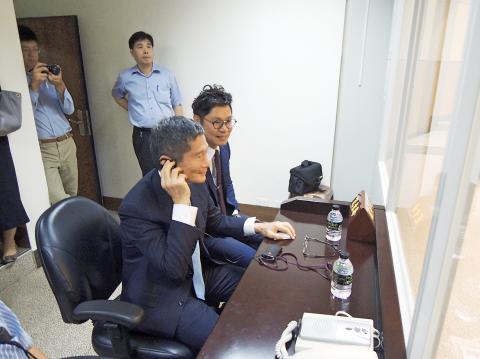The Miaoli County Council yesterday became the first in the nation to hold a session entirely in the Hakka language and was awarded the “Hakka-friendly Environment” marker by the Hakka Affairs Council.
Hakka Affairs Council Minister Lee Yung-te (李永得) said the accomplishment was a historic day for the development of Taiwanese culture.
The council had initiated trial-runs for full-Hakka sessions since Monday last week, a move that was supported by Miaoli County Council Speaker Chung Tung-chin (鍾東錦) and other councilors, the agency said.

Photo: Chang Hsun-tung, Taipei Times
During the trial sessions, the council provided two translators to translate the Hakka question-and-answer session into Chinese, Lee said.
Lee yesterday pledged that the agency would fully fund all the translator fees for Miaoli County Council sessions.
The agency said the move had a legal basis in the Hakka Basic Act (客家基本法), promulgated on Jan. 31 last year, the National Languages Development Act (國家語言發展法), passed on Dec. 25 last year, and the Regulations to Implement Hakka as an Official Language (客語為通行語實施辦法).
As about 65 percent of the population of Miaoli County speaks Hakka, it should be the main official language of the county, as stated in the Hakka Basic Act, the agency said.
Miaoli County has spearheaded the return of Hakka language to public use among city and county councils nationwide, Lee said.
Lee also commended the county council for fostering a Hakka-friendly environment.
“If children do not learn Hakka when they are young, they will never be able to learn it,” Lee said.
Speaking, rather than learning, is how the native tongue is passed from one generation to the next, Lee said, adding that to foster such an environment, Hakka must be spoken not only at home, but also in public places such as the county council and township offices.

Alain Robert, known as the "French Spider-Man," praised Alex Honnold as exceptionally well-prepared after the US climber completed a free solo ascent of Taipei 101 yesterday. Robert said Honnold's ascent of the 508m-tall skyscraper in just more than one-and-a-half hours without using safety ropes or equipment was a remarkable achievement. "This is my life," he said in an interview conducted in French, adding that he liked the feeling of being "on the edge of danger." The 63-year-old Frenchman climbed Taipei 101 using ropes in December 2004, taking about four hours to reach the top. On a one-to-10 scale of difficulty, Robert said Taipei 101

Nipah virus infection is to be officially listed as a category 5 notifiable infectious disease in Taiwan in March, while clinical treatment guidelines are being formulated, the Centers for Disease Control (CDC) said yesterday. With Nipah infections being reported in other countries and considering its relatively high fatality rate, the centers on Jan. 16 announced that it would be listed as a notifiable infectious disease to bolster the nation’s systematic early warning system and increase public awareness, the CDC said. Bangladesh reported four fatal cases last year in separate districts, with three linked to raw date palm sap consumption, CDC Epidemic Intelligence

US climber Alex Honnold left Taiwan this morning a day after completing a free-solo ascent of Taipei 101, a feat that drew cheers from onlookers and gained widespread international attention. Honnold yesterday scaled the 101-story skyscraper without a rope or safety harness. The climb — the highest urban free-solo ascent ever attempted — took just more than 90 minutes and was streamed live on Netflix. It was covered by major international news outlets including CNN, the New York Times, the Guardian and the Wall Street Journal. As Honnold prepared to leave Taiwan today, he attracted a crowd when he and his wife, Sanni,

Two Taiwanese prosecutors were questioned by Chinese security personnel at their hotel during a trip to China’s Henan Province this month, the Mainland Affairs Council (MAC) said yesterday. The officers had personal information on the prosecutors, including “when they were assigned to their posts, their work locations and job titles,” MAC Deputy Minister and spokesman Liang Wen-chieh (梁文傑) said. On top of asking about their agencies and positions, the officers also questioned the prosecutors about the Cross-Strait Joint Crime-Fighting and Judicial Mutual Assistance Agreement, a pact that serves as the framework for Taiwan-China cooperation on combating crime and providing judicial assistance, Liang